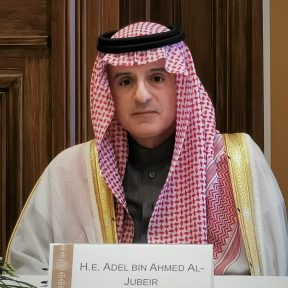
Adel al-Jubeir
Photo from Wikimedia Commons / Author of Photo: Elekes AndorOverview
* Foreign affairs adviser to Saudi Arabia’s Crown Prince Abdullah
Born on February 1, 1962 in Saudi Arabia, Adel al-Jubeir is the foreign-affairs adviser to Saudi Arabia’s Crown Prince Abdullah. Al-Jubeir was educated not only in his homeland, but also in Germany, Yemen, Lebanon, and the United States. In 1982 he graduated with a bachelor’s degree in political science and economics from the University of North Texas. Two years later he earned a master’s degree in international relations from Georgetown University.
In 1987 al-Jubeir was appointed into the Saudi Diplomatic Service, which assigned him to the Royal Embassy of Saudi Arabia in Washington, DC. In 1990-91, he was part of the Saudi team that established the Joint Information Bureau at Dhahran during Operation Desert Shield/Desert Storm. In 1992 he was a member of the Saudi delegation to the Multilateral Arms Control Talks in the District of Columbia. In 1994-95 he was a Visiting Diplomatic Fellow at the Council on Foreign Relations in New York. On January 29, 1997, he was appointed as Saudi Ambassador to the United States.
In 2000 al-Jubeir was named Director of the Saudi Information and Congressional Affairs Office in Washington. That same year, he was appointed Foreign-Affairs Advisor in the Crown Prince’s Court. In August 2005 he was assigned to the position of Advisor at the Royal Court.
In 2006 al-Jubeir, who has lectured at numerous universities and academic institutions in the U.S., received an honorary doctorate in humane letters from the University of North Texas.
In June 2003 al-Jubeir announced that a recent (May 12th) al Qaeda attack in Riyadh had caused the Saudi government to step up its anti-terrorism measures. “May 12 was a turning point for Saudi Arabia,” he said. “The repercussions of the bombings have galvanized our people in the war against terrorism and have mobilized public opinion against extremism.”
But al-Jubeir’s denunciations of terrorism were tempered by his refusal to publicly condemn the organization Hamas. For instance, when a reporter, referring to a suicide bombing that had occurred in Jerusalem a few days earlier, asked al-Jubeir whether he was “prepared to condemn Hamas” for carrying out such an “act of terrorism,” al-Jubeir replied:
“We condemn terrorism in all its forms and shapes. Any time you kill innocent people, it’s condemnable, whether it’s perpetrated by one side or the other. Our objective is to move beyond this violence and towards a situation where people can lead normal lives…. [However] I think that the prime minister of Israel has to think very seriously about his policies.”
In al-Jubeir’s view, Israel’s recent assassination attempt of a Hamas leader had essentially put Hamas in a position where it had no choice but to respond with violence.
While denying that the Saudi government funded Hamas directly, al-Jubeir acknowledged that some Saudi money might occasionally have found its way indirectly to the coffers of Hamas’ “political wing.” Moreover, al-Jubeir defended the Saudi practice of providing aid to the families of dead Palestinian suicide bombers, explaining that those families should not be punished for the misdeeds of their relatives.
Islam scholar Stephen Schwartz, a senior policy analyst with the Foundation for the Defense of Democracies, said he was “not surprised” by al-Jubeir’s refusal to explicitly condemn Hamas. “They [the Saudis] control Hamas,” said Schwartz.
Another critic of the Saudi government, Saudi Institute leader Ali Al-Ahmed, said that the Saudi link to Hamas was strong and undeniable. Therefore, he explained, al-Jubeir “can’t” condemn Hamas without being “fried back home” and relieved of his duties as spokesman.